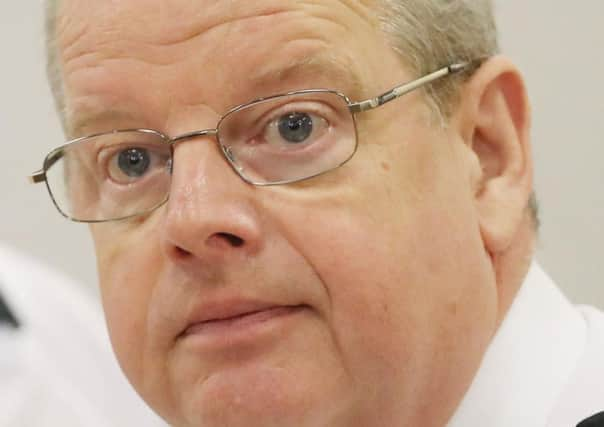Collusion claims an ‘obstacle’ to recruiting Catholic police officers - Byrne


Simon Byrne said the falling number of Catholic recruits was one of the PSNI’s “top worries” as he expressed concern about sliding down a “slippery slope” after peace process efforts to make the service more representative.
Giving evidence to a Westminster committee, Mr Byrne highlighted legacy claims about police colluding with paramilitaries during the Troubles as one of the obstacles the PSNI had to overcome if it wanted to boost applications from the nationalist community.
Advertisement
Hide AdAdvertisement
Hide AdHe said the problem demonstrated the need to remove legacy investigations from the PSNI’s remit so it could focus on policing the present.
Mr Byrne said the threat posed by dissident republicans was also discouraging young Catholics from joining up, as it could force them to cut ties with friends and family and leave the neighbourhoods where they grew up.
The chief constable said he had met influential people within Catholic communities, including church figures, to encourage them to advocate policing as a career choice.
“When I speak to people in communities but listen as well, there are some impediments which seem to be difficult for us,” he said.
Advertisement
Hide AdAdvertisement
Hide Ad“So the whole issue of legacy is one that will be cited as a reason for not joining the PSNI because of all those perceptions around collusion and ‘what is the organisation I’m joining?’.
“Now, whether you accept that (collusion allegations) or not is a separate question.
“More than once we have asked that legacy is taken off the PSNI - it’s a barrier to recruitment from the Catholic community.”
On the dissident republican threat, Mr Byrne told MPs: “That makes it very difficult, particularly for colleagues from the Catholic community, to join because they have to have conversations about not telling their family per se sometimes, or moving away from friends, family and all sorts of networks, so it can isolate them.
Advertisement
Hide AdAdvertisement
Hide Ad“So we need to redouble our efforts and I think it’s only eventually when we get critical mass that we’ll achieve that.”
Mr Byrne, who was giving evidence on organised crime, said a return of the controversial 50/50 recruitment policy was not something he was considering, but he would not rule it out in the future.
“It would be foolish to discount entirely something like that returning,” he said.
The 50/50 policy - which ensured an equal number of Protestants and Catholics were recruited - was recommended by Lord Patten as part of peace process reforms to address the historic under-representation of officers from a nationalist background.
Advertisement
Hide AdAdvertisement
Hide AdThe policy helped drive significant change, increasing the percentage of Catholic officers from 8% to over 30%, but it drew much criticism from unionist politicians.
The measure ended in 2011 but a recent downturn in the number of Catholic recruits - linked to the dissident republican threat against them and their families - has prompted calls for its reintroduction.
Mr Byrne noted that many of the Catholic recruits who joined at the turn of the century would be retiring in the coming years.
That, coupled with present-day reduced rates of Catholic recruitment, would see the PSNI go “backwards” in terms of efforts to be representative of the communities it serves, he said.
Advertisement
Hide AdAdvertisement
Hide Ad“My worry, frankly, is that if we are not careful we begin a slippery slope of going the wrong way,” said Mr Byrne.
Mr Byrne said there was also a need to boost recruitment from working class communities - both nationalist and unionist - from members of the LGBT community and from foreign national communities living in Northern Ireland.